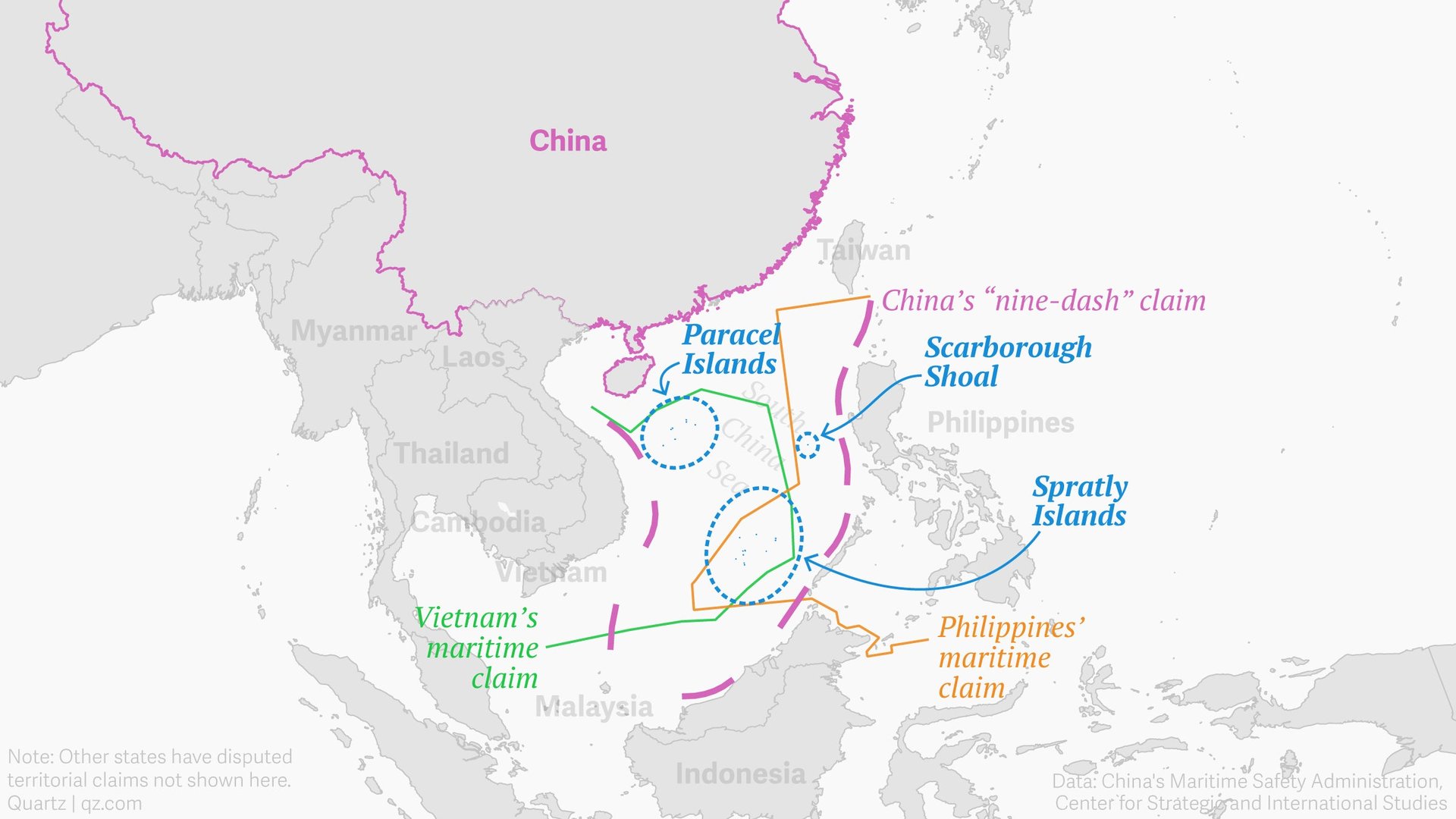China’s controversial South China Sea map is entering pop culture thanks to US companies
An obscure map used by China to claim ownership of virtually the entire South China Sea, but rejected internationally, is now finding its way into mainstream media thanks to an unlikely and perhaps unwitting accomplice: US companies.


An obscure map used by China to claim ownership of virtually the entire South China Sea, but rejected internationally, is now finding its way into mainstream media thanks to an unlikely and perhaps unwitting accomplice: US companies.
Last week, an ESPN broadcast included a graphic that showed China’s territory as including the disputed area within the nine-dash line. The map placed Taiwan—an independently functioning democracy—as well as islands and maritime zones claimed by the Philippines, Vietnam, Taiwan, Malaysia, and Brunei, squarely within territory declared by China as its own.
The line first appeared on an official Chinese map in the 1940s, and then was adopted by the Communist Chinese republic. In 2016, an international tribunal ruled the line was essentially illegal.
Nevertheless, China’s nine-dash map also appeared on a much larger screen this month: in Abominable, the new animated family movie featuring a modern Chinese family’s encounters with a giant fluffy yeti. Though the film has done well in the box office, it has ruffled some furs in Vietnam precisely because of that map. On Monday, Vietnam pulled the film from cinemas over objections to the map. The Philippines, which initiated the case that resulted in the 2016 ruling against China, is considering a cut to the “offending scene,” and a boycott of all Dreamworks productions.
While ESPN’s move may well have been a blunder, it appeared during a week in which American companies faced criticism for what many saw as corporate subservience to Beijing.
After China reacted furiously to a now-deleted tweet in support of Hong Kong’s pro-democracy protesters from Daryl Morey, the general manager of the Houston Rockets, the NBA issued a Chinese-language statement, in which it said it was “disappointed” by Morey’s views, and that they had “greatly hurt the feelings of Chinese fans.” The same week, US gaming company Blizzard banned a professional player from Hong Kong (though the punishment has now been lightened) for shouting protest slogans in a post-match interview.
Then came a series of decisions from Apple: removing the Taiwan flag emoji, banning a Hong Kong protest map app from its app store (Apple has also removed the Quartz app from its China store). And in a leaked ESPN memo, a news director at the network forbade staff from discussing Hong Kong protests while covering the NBA-China saga.
A ESPN spokesman declined to comment, but directed Quartz to an article from Sports Business Daily. The article noted that the nine-dash line was “mistakenly used” and that another ESPN broadcast had used “a completely different map” that did not include the line.

In the film’s case, it’s less plausible that the inclusion of the nine-dash map was a mistake on the producer’s part. As the first Hollywood cartoon to feature a modern Chinese family, the film is a collaboration between Universal’s DreamWorks Animation and the Shanghai-based, Chinese production company Pearl Studio, which is owned by China Media Capital, an influential Chinese investor with aspirations of building a global media empire. And the movie was meticulously tailored for a Chinese audience: even dialogue was translated in such a way that lip movements would mostly sync up with the original English script, and producers labored over how to get the details of a modern Chinese home kitchen exactly right.
Given this degree of attention to detail, it’s likely the decision to include this map was carefully considered.
As US companies navigate an increasingly globalized pop culture landscape, questions of how to deal with—or carefully skirt—competing territorial claims will come up with growing frequency. All the while, China is throwing its full force behind spreading its nationalist message beyond its borders through a combination of propaganda and, it appears, business partnerships.
“Because people and companies outside of China don’t know or care much about disputes like the nine-dash line, they find themselves adopting these nationalist propaganda positions without knowing much about them,” said Julian Ku, a professor at the law school of Hofstra University in New York, adding that the two instances of the map’s use likely reflect “a combination of Western companies being ignorant and apathetic about these territorial issues.”
DreamWorks did not respond to requests for comment, and Pearl Studio declined to comment.
This story was updated to include the Philippines’ response to the movie.